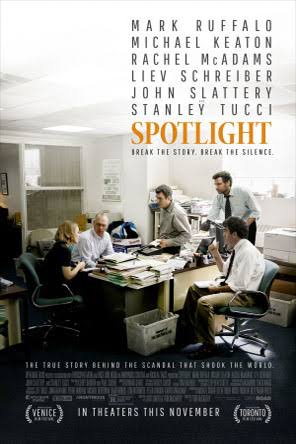 Tonight, I look back to a scandal that has rocked the institution that preserved Western Civilization in the Dark Ages, transformed hospitals, and, believe it or not, science. Thirteen years ago, the Boston Globe revealed a series of stories to the public, and many in the world began to distrust her. What I speak of is the Catholic Church, and the priest sex scandal.
Tonight, I look back to a scandal that has rocked the institution that preserved Western Civilization in the Dark Ages, transformed hospitals, and, believe it or not, science. Thirteen years ago, the Boston Globe revealed a series of stories to the public, and many in the world began to distrust her. What I speak of is the Catholic Church, and the priest sex scandal.
This is a New England film, as many big parts of New England life are displayed throughout it via product placement. Dunkin’ Donuts, W. B. Mason, and other familiar logos are seen throughout it. For those of us who know Boston well, many popular, yet not mainstream popular, or, rather “hipster” streets are seen and spoken about through dialogue.
We begin in 1976, in which a bishop visits a Boston Police station in regards to a priest who abused a young boy, and he assures the boy and his parents they will never hear from the priest again, and the bishop and the priest then drive off. Twenty-five years later, members of the Boston Globe have a goodbye party for one of their editors who is stepping down after the New York Times bought out the newspaper.
New editor Marty Baron (Liev Schreiber) comes in from Miami and expresses interest in going deeper into a case involving a priest, who severely abused countless children, as he feels there is something that is being hidden from the public.
How could somebody take on a church? This is the basic theme that is dealt with as the journalists from the Globe’s Spotlight section begin to dig deeper and deeper into this horrible scandal. A member of a survivor group, SNAP, comes to them, having previously tried to contact the paper many years prior. While his organization is small, comprised of only 10 members, Spotlight eventually catches on and realizes there has to be a scandal in their midst.
While they are presented with the same facts that we are today when we discuss the scandal, that perhaps only a very small percentage of ordained priests have engaged in such awful activities, they realize they need to take action because there are numerous victims out there with stories to be heard.
Several scenes take place in which the journalists meet with the survivors (as one asserts they are survivors because some ended up taking their lives) and they tell their stories. It is a completely heart-wrenching ordeal to listen to, as they describe being initially excited that their parish priest took an interest in them, only to violate the in the most unimaginable way.
Cardinal Bernard Law, the Archbishop of Boston at the time, is our enemy, despite his cheerful and outgoing personality. The stories of Church corruption in the Middle Ages suddenly return to 21st century America. Cardinal Law is reaching out to officials, taking advantage of loopholes to keep legal documents confirming his corruption away from the public’s eyes.
And though he only appears in three or four scenes, he does not have the lasting effect of the antagonizing villain that we see in other films, such as Anthony Hopkins’ portrayal of Dr. Hannibal Lecter in The Silence of the Lambs consisting of only 16 minutes of screen time, but earning the Academy Award for Best Actor in a Leading Role, and being ranked by the American Film Institute as the greatest villain in the history of film.
Many interesting points are made, as people bring up that these stories were brought to the newspapers on many occasions, but turned down. Michael Keaton’s character, Walter “Robby” Robinson, notes that he originally shot down the claims when he worked for a different section of the Globe 20 years prior, and another brings up that we all stumble around in the dark and only realize what has happened when the light enters. Boston is a tightly-knit community, one character says, pointing out that if it’s true it takes a village to raise a child, as he quips, it also takes a village to [destroy him].
I will not post a disclaimer to share that I am a lifelong Catholic, myself, and have been brought up in the Church in a very intimate manner. Baptism, CCD, First Communion and Reconciliation, Confirmation, Catholic high school, and even participated in campus ministry as a student at Quinnipiac. I do not intend to bash Catholicism, as journalists such as Christopher Hitchens might have done when reviewing a film like this, nor do I seek to engage in apologies, but rather to show the honest side of the faith.
This film has been received well by the Church, of all viewers, especially by Seán Cardinal O’Malley, Law’s replacement as Archbishop of Boston, who claimed the investigation by the Globe prompted the Church “to deal with what was shameful and what was hidden.” Vatican Radio also shared similar words, calling the film honest and compelling. Anyone who is involved with their local church can describe how there is now a zero-tolerance policy for things of this nature, and how Popes Benedict XVI and Francis have made these events a main focus during their papacies.
I will close with a reference to Dante Alighieri’s epic poem, The Divine Comedy, since I read all three volumes this summer … to my surprise. Plus, who doesn’t feel super smart when they close an article with a quote from a piece of classical literature?
(Dante addresses a pope who is confined to be buried face down into a furnace, who is guilty of simony [buying of sacred things])
“And were it not that I am still constrained by the reverence I owe to the Great Keys [1] you held in life, I should not have refrained from using other words and sharper still; for this avarice of yours grieves all the world, tramples the virtuous, and exalts the evil.
Of such as you was the Evangelist’s vision when he saw She Who Sits upon the Waters locked with the Kings of the earth in fornication.[2] Gold and silver are the gods you adore! In what are you different from the idolator, Save that he worships one, and you a score?”
Inferno, Canto XIX
[1] Papacy, the “Keys to the Kingdom of Heaven” given to St. Peter by Christ.
[2] The Whore of Babylon, from Revelation 17-18

About the Author: Kevin Ganey has lived in the Lyme/Old Lyme area since he was three-years-old, attended Xavier High School in Middletown and recently graduated from Quinnipiac University with a degree in Media Studies. Prior to his involvement here at LymeLine.com, he worked for Hall Radio in Norwich, as well as interned under the Director of Communications at High Hopes Therapeutic Riding Center. Kevin has a passion for movies, literature, baseball, and all things New England-based … especially chowder.
the film, here and there also known as “all the pope’s men” after alan pakula’s watergate scandal classic, and which is about violations of a number of commandments by priests of the church, only hints at the degree of cover-up still in progress…cardinal law, we are told, is safe in a high vatican post, while cardinal roger mahoney (los angeles), continues to reside peacefully in his parish rectory protected, as are so many others, from the consequences of his betrayal…the cabal of bishops behind the obstruction is and will, to protect their positions of power, continue to be the main force opposing pope francis’ call for more compassionate (and less authoritarian) church…as to the role of the church in the dark or early middle ages, a more specific timeline would help in setting a framework for judging the church’s capability and culpability during one of the more interesting times the history of religion, one in which in which so many of today’s headlines have their origin.